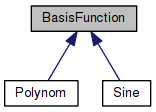#include <basisfunction.h>

Public Member Functions | |
| BasisFunction (void) | |
| virtual | ~BasisFunction (void) |
| void | operator() (double x, ArrayD &y) const |
| virtual void | basis (double x, ArrayD &y) const |
| double | operator() (const ArrayD &c, double x) const |
| virtual double | value (const ArrayD &c, double x) const |
Detailed Description
Base class of all basis functions.
- Version
- 1.0
Constructor & Destructor Documentation
|
inline |
Constructs a BasisFunction.
|
inlinevirtual |
Destructor.
Member Function Documentation
|
inline |
Returns the values of the first y.size() basis functions at position x in y. This operator is NOT virtual in order to speed up computation when using templates. If you need a virtual function as an interface, implement basis().
References BasisFunction::basis().
Referenced by BasisFunction::basis(), and BasisFunction::value().
|
virtual |
Returns the values of the first y.size() basis functions at position x in y. This function IS virtual and might slow things down. If you need a NON virtual function as an interface, implement operator().
Reimplemented in Sine, and Polynom.
References BasisFunction::operator()().
Referenced by BasisFunction::operator()().
|
inline |
Returns the linear combination of the first c.size() basis functions at position x with coefficients c. This operator is NOT virtual in order to speed up computation when using templates. If you need a virtual function as an interface, implement value().
References BasisFunction::value().
|
virtual |
Returns the linear combination of the first c.size() basis functions at position x with coefficients c. This function IS virtual and might slow things down. If you need a NON virtual function as an interface, implement operator().
Reimplemented in Sine, and Polynom.
References BasisFunction::operator()().
Referenced by BasisFunction::operator()().
The documentation for this class was generated from the following files:
 1.8.6
1.8.6